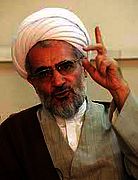Is Ayatollah Zanjani’s Edict a Model to Breakthrough Religious Deadlocks?
» Drinking Water While Fasting: Reactions to a Controversial Fatwa
A fatwa that allows Shiite fasters to drink water during their day-long fast that was issued by senior ayatollah Bayat Zanjani a few days ago has caught the attention of Iran’s media and is stirring controversy. The ayatollah Zanjani’s official website has acknowledged that after the fatwa a number of clerics had gone to the senior cleric’s house and raised their issues with him. In cyberspace too there has been much reaction because while the fatwa is not political in nature it does contradict the views of ayatollah Khomeini and ayatollah Khamenei.
A Fresh Look at Religion
On July 12, 2013 ayatollah Bayat’s website published a report that was rapidly reproduced in cyberspace. The story said that according to verified documents and detailed narratives connected to Imam Sadegh (one of the twelve revered Shiite imams, rightful successors of prophet Mohammad in Shia) those who fast but cannot tolerate the pressure of thirst may drink just enough water to stop the thirst which would not invalidate their fast and they do not have to refast. The author also wrote that this was not the original view of the cleric in his guide but that it was a new religious edict.
Among the first responders was Etemad newspaper which quoted seyed Reza Borghei Modarres from the Qom Theological Seminary and ayatollah Khomeini’s former representative in the Persian Gulf states. He concurred with the weight of the fatwa and said many similar viewpoints had been made in Shiite figh (jurisprudence) in the past and added that “we cannot be very strict” about enforcing Shiite rules or insist that only the rules be the standard.” He concluded that a learned mujtahid could announce his fatwa based on prevalent conditions. In short, he said the fatwa was legitimate and could be followed. He also called Bayat’s fatwa a “bold” act and added that Islam was not a frozen or rigid religion.”
Mohammad Ayub Kazemi is another cleric who welcomed the fatwa and echoed Bayat’s arguments and logic. He also praised Bayat and even went further by saying Bayat maybe the cleric who can break through the religious bottlenecks that currently exist and mentioned some areas where they exist to be music, relations between men and women, the hijab, relations between people and authorities, economic issues, etc.
Parsineh website also published a story supporting the fatwa and quoted a number of other ayatollahs who had said drinking was permissible during Ramadan fasting.
But the majority of the official media in Iran remained silent on this indicating that there are those who do not approve of it. Mehr news agency also wrote about the “controversial fatwa over drinking water during fasting” and wrote that senior clerics had said that such an act would invalidate the fast, as they referenced the views of ayatollah Khamenei, ayatollah Makarem Shirazi and ayatollah Sistani to support this.
Science is Good, but not Modernity
Mehdi Khalaji, an Islamic scholar wrote on his Facebook page that issuing a fatwa like that “would not reconcile Islam with the human and society’s modern condition.” He added that this was done merely to please the young and become “modern.” He concluded that to be a mujtahid (a senior cleric who is acknowledged to issue religious edicts) requires that the person be knowledgeable, not that his fatwas be modern.
An Authoritative Cleric with a Blocked Website
In Shiite Islam, a marjae taghlid (senior cleric who can be the source of emulation for others) must have many credentials, including the publication of a religious book. And even though marjae taghlid have had a prominent political and religious position in contemporary history, it has never been clear as to how they attain that title and authority. This is why it is not clear who in fact is a marjae taghlid in Iran.
Some specialists on religious issues have argued that in recent years with the dominance of the supreme leader of the Islamic republic, theological centers have come under the influence of political considerations and some clerics have been boycotted while others supported.
After the 2009 presidential election, ayatollah Zanjani took positions of support for Mir-Hossein Mousavi and condemned officials for their confrontation of the protestors. His website has been blocked since 2010. These days, he is not recognized as a marjae taghlid in Iran’s official media, even though he had been elected to parliament and has served in the Majlis.


